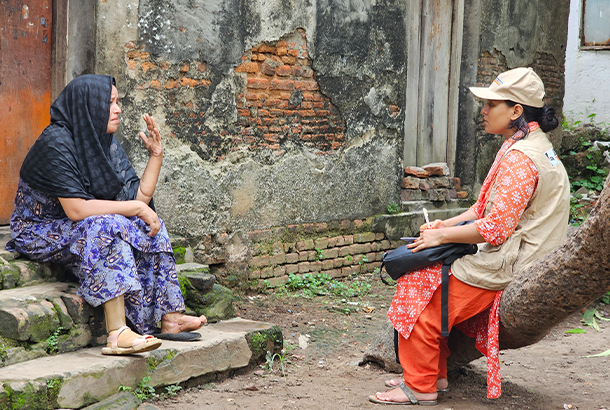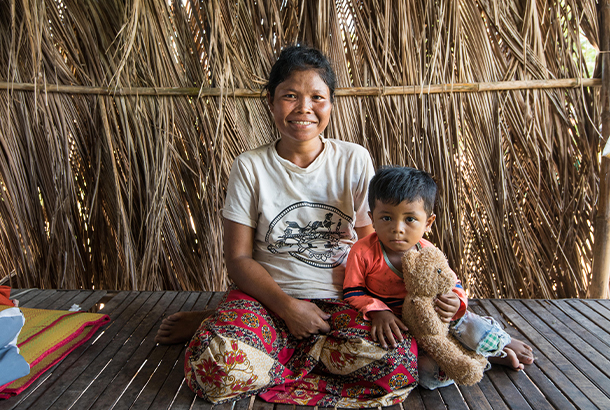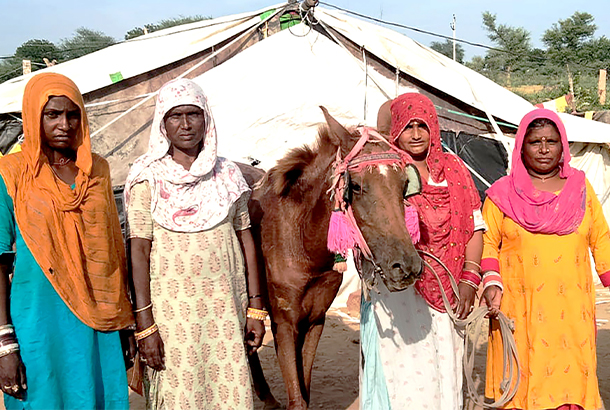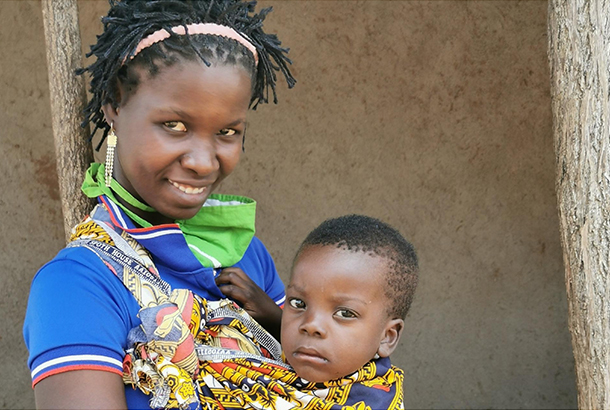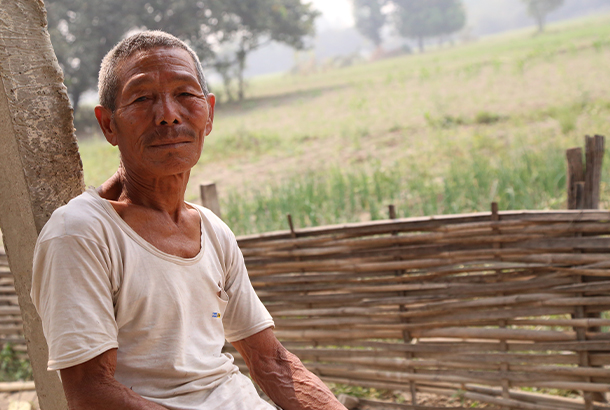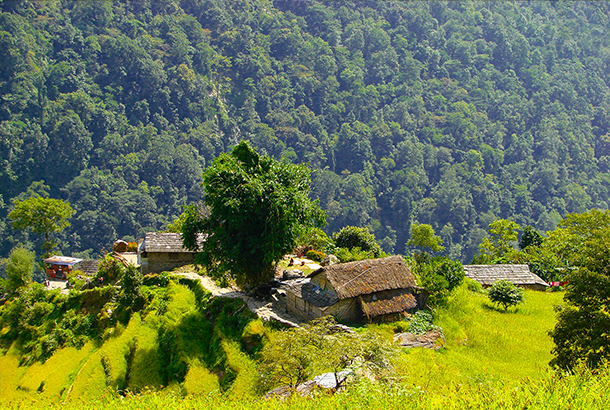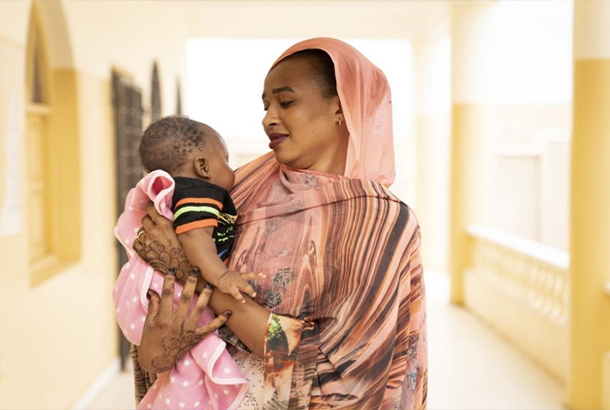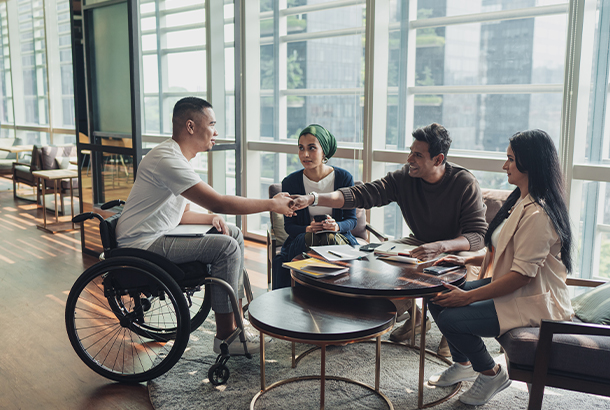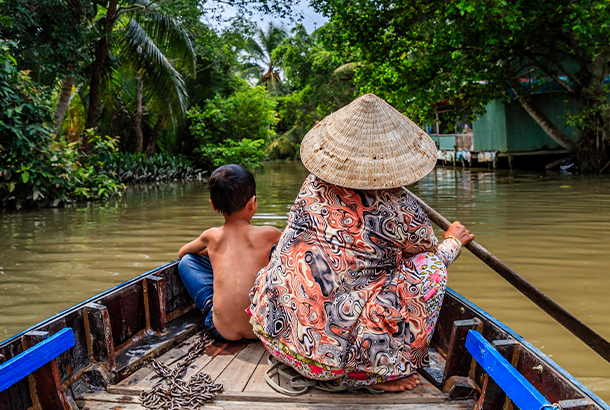Short stories on social protection
Human Rights 75 Initiative
Mamataj’s story: Right to disability protection
Child Labour: Action-Research-Innovation in South and South-Eastern Asia, CLARISSA (Bangladesh)
Mamataj* lost part of one leg in a burning accident. Life in a slum in Dhaka, the capital of Bangladesh, is already hard enough, but Mamataj’s disability pushed her deeper into poverty and social exclusion.
The accident left her with severe pains on her back and one wrist, making it difficult for her to work. As a result, Mamataj, 38, struggled to pay for her household expenses and for her daughter’s school.
At first, Mamataj received 700-750 Bangladeshi taka (US$6) per month in disability allowances from the State’s Social Services Office. It was not much, but it helped. One day, however, the allowance stopped abruptly, forcing Mamataj to rely on friends and community members to survive.
Mamataj’s case is not rare. Eligible recipients, especially the most excluded and vulnerable in society, often do not receive social protection benefits due to numerous legal and practical barriers, impacting their right to social security.
However, a child rights and advocacy organization heard of Mamataj’s story. Social workers from the Child Labour: Action Research in South and Southeast Asia (CLARISSA) met with her and arranged to have the Social Services Office reinstate her disability benefits.
Social workers also arranged for Mamataj to receive additional cash transfers from CLARISSA’s social protection scheme to help her bridge the gap between her household needs and the government’s social security payments.
“This cash made my life tranquil and now I can save for my daughter's future,” said Mamataj, who was abandoned by her husband after the accident.
Social security contributes to eradicating poverty and inequality, and to promoting human dignity and social inclusion. It also makes it possible for people to enjoy other human rights, such as the rights to food, housing and an adequate standard of living, to education and to health, especially by marginalized people, including women and people with disabilities.
Social protection means better health
The German Development Cooperation (Cambodia)
Sometimes, Khean would send her children to school without breakfast. Other times, the family would not have enough food for lunch and dinner.
Cambodia has made significant progress against poverty over the past two decades, but the Southeast Asian country is taking a heavy hit from the economic crisis caused by the COVID-19 pandemic.
With jobs drying up, many families like Khean’s are falling below the poverty line. Khean is seven months pregnant with her sixth child. Her husband works in construction, but his income only supports the family for two weeks every month.
“Only my husband earns money,” said Khean, who lives in Kampot province and stays home taking care of the children. “He earns around US$150 per month. Sometimes, he even earns less because there are fewer jobs.”
With help from the German Development Cooperation, Khean’s family was identified as a beneficiary of a Cambodia government social assistance program to reduce poverty.
The Equity Card allows poor and at-risk households to access the government’s social assistance benefits so that families can afford food and health and enjoy income security.
“The cash transfer serves the livelihood of my family a lot. I can buy rice, meat, and vegetables to cook for my children, and support my children to go to school,” she said.
With the government providing cash transfers to pregnant women living in poverty with children under 2, Khean receives additional assistance up to four times when she seeks health services.
“I get US$10 when I visit the health center for maternal health check-ups and US$50 for delivering a baby there. I also get money when I take my child to the health center for vaccination and health check-ups.”
Births attended by skilled health personnel, as well as regular check-ups, help alleviate complications related to pregnancy and birth, and reduce maternal and neonatal mortality.
The right to social security is recognized in numerous human rights instruments, including the Universal Declaration of Human Rights.
Sustainable livelihoods for rural women
Brooke Action for Working Horses and Donkeys (India)
In many rural communities across the world, working animals are essential to the livelihoods of poor families.
Animals are used to plough fields, transport fertilizers and water for crops, or to carry produce to the market. In rural India, it is often women who are the main carers of their family’s horses and donkeys.
To better care for their animals’ health and welfare, women in rural communities in India are organizing support groups. The Women’s Equine Welfare Groups pool savings, which the women use to loan themselves to meet unexpected financial needs, such as veterinary care or medicines if animals fall ill.
One such women’s group is active in the town of Churu, in the desert region of the state of Rajasthan. With the support of Brooke, an international charity that protects the lives of horses, donkeys and mules to give people the opportunity to work their way out of poverty, the group came up with diversified sources of income, such as selling vegetables and animal fodder, sewing, and saddlery.
As the group’s savings began to grow, their financial literacy and confidence improved too. This increased knowledge and awareness allowed the women’s group to access insurance schemes, such as the Equine Insurance Facility by Rajasthan’s Animal Husbandry Department, and self-insurance schemes for the poor by the Government of India.
As a result, the community has become more resilient to unexpected shocks and can continue using their working equids to build stable and sustainable livelihoods.
“This program has enabled us to take good care of the equines and earn our livelihood,” said Rachna, President of the Women’s Equine Welfare Group in Churu.
The recognition and realization of the right to development and the right to social security are key to redressing structural injustice and inequalities within and among countries, and to the enjoyment of economic, social and cultural rights by disadvantaged and marginalized individuals and groups.
Cash and care improve child well-being
UNICEF Social Policy and Social Protection (Mozambique)
Noémia had a hard time after giving birth to Américo. As a single mother, she struggled to buy food for her baby and keep up the work at the family farm.
“He gave my child a name by text message (SMS), but my child doesn’t know his father,” said Noémia, 23, visibly sad while holding Américo close.
“I live alone, I am divorced. When I was pregnant my husband found work in Nacala and never came back. He was told his child was born, but he has never come back to see his son,” she said, adding the father does not provide for the child or send any money.
Noémia heard about the Child Grant from Mozambique’s National Institute of Social Action (INAS). With the cash she received from the Child Grant, she managed to save up US$47 to build her own house and kitchen.
“Now I have my own space, I feel better and more independent,” said Noémia, who lives in Lalaua District, in the province of Nampula.
While her mother takes care of Américo, Noémia goes to work on the machamba (a small family farm) or collects water. Noémia cultivates maize and mandioca, and with the grant she can buy food and clothes for Américo.
The Child Grant, targeting children aged 0-2 years, is a key part of the Government of Mozambique’s social protection strategy and a component of the Basic Social Subsidy Program, which aims to strengthen Mozambique’s basic social protection system, targeting vulnerable populations.
Besides the cash transfer, the program focuses on social behaviour change on nutrition, water, sanitation and hygiene, as well as childcare practices. A component of the program is case management, which is offered to households classified as most vulnerable.
The start-up phase of the Child Grant program is implemented by the Ministry of Gender, Children and Social Action, with technical support from UNICEF, and financed by the governments of Sweden, Netherlands, and United Kingdom.
The start-up phase was initiated in September 2018 and finalized in December 2021, when all 15,345 children and their caregivers received 24 months of payments and graduated from the program.
Based on the positive outcomes, the government approved its expansion to reach 250,000 more children and families by 2026.
Assisting the old
We Social Movements (Nepal)
In Nepal, the elders receive an age allowance under the government’s security program. Its aim is to support the welfare of older people and to improve their social and economic status.
Gopal, 74, has been receiving the old age allowance for the past four years.
However, it wasn’t easy at first.
“I didn’t know about my age, or what papers I needed,” he explained. “We needed to go look for my papers and find my birth date, so I would know when I could start getting this grant.”
With the help of We Social Movements, a charity organization that promotes the right to social protection and the eradication of poverty and exclusion, Gopal got his papers in order.
Gopal now receives his grant every four months, which helps him buy food and medication.
“I suffer from gastritis. I go through a bottle of pills almost every 10 days, which costs me 200 Nepalese rupees (US$1.5),” he said.
“I take my bicycle to go there whenever the ward office member tells me the grant has been deposited. He lives just around the corner, so it is easy. He also made sure I got the cash during the (COVID-19) lockdown, when the banks were closed. There have never been any delays. I usually withdraw the entire amount when I get it.”
Gopal’s wife suffers from rheumatism and aching bones. She also receives an old age allowance, as she is older than him.
“I think it is right that the government should support old people, because many times, their children can’t take care of them,” he said. “We worked a lot and still continue to labour, but that is not always possible.”
Social security is a human right enshrined in the Universal Declaration of Human Rights (Article 25) and the International Covenant on Economic, Social, and Cultural Rights (Article 9). The right to social security is also recognized in the Nepali Constitution (Article 43).
Allowances for single women and their children
We Social Movements (Nepal)
Mahottari spends her day labouring on a plot of land next to her house in Nepal’s Madhesh province.
“We grow crops,” said Mahottari, 35. “We make every effort to grow crops. Sometimes we work from early in the morning to dusk.”
Her son migrated to India for work and occasionally sends some money, but it is not enough to feed the family, which includes her grandson, 3, and granddaughter, 2. Her daughter-in-law helps her in the field.
With the support of a community-based organization called Community Family Welfare Association, Mahottari managed to get access to the government’s Single Women's Allowance program, a social security allowance scheme designed to assist people who are socially and economically vulnerable.
“The worker from the Community Family Welfare Association visited my house and said the government is providing 800 Nepali rupees (US$6) a month for my grandchildren,” she said.
The worker helped Mahottari sort out her paperwork, which included obtaining the son’s registered marriage certificate and the birth certificates of the two grandchildren.
Social security contributes to eradicating poverty and inequality, and to promoting human dignity and social inclusion. It also makes it possible for people to enjoy other human rights, such as the rights to food, housing and an adequate standard of living, to education and to health.
Mahottari said that thanks to the allowances her family can now purchase food and her children get sick less often.
“The worker helped my grandchildren get flour. It is so healthy that my granddaughter gained 3 kilos in a year. I receive 1.5 kilos of flour every month.”
In Nepal, daughters who are single when their fathers pass away are frequently left in precarious situations, unable to marry because they lack a dowry, and without the means to provide for themselves. The problem is more dramatic among poor families and is believed to be one of the main drivers of female child labour.
Addressing discrimination requires recognizing the centrality of gender equality and taking active measures to secure gender equality. The enjoyment of the right to social security by women as individual rights holders can make an enormous contribution to their socio-economic empowerment.
Mother and child assistance boosts health, well-being
UNICEF Social Policy and Social Protection (Sudan)
Mahasin, a 26-year-old mother, splits her time between Suakin, a port city on the west coast of the Red Sea, and Al-Lalaloba, a rural district in the northwestern part of Port Sudan city.
In May 2021, she found out about the Mother and Child Cash Transfers program when visiting the center.
“The support I received was wholesome. They taught me how to develop a delivery plan, and I used the fund to buy essentials for myself and the baby. I bought food and milk,” said Mahasin.
Supported by UNICEF, the program is designed for the first 1,000 days of a child’s life and promotes women's health by providing care services for pregnant and lactating women.
Mahasin was heavily pregnant with Husam, her first child, when she registered at Al-Lalaloba health center.
“Some women don’t have enough food for their families, and some can’t even afford to get a taxi to travel to a nearby hospital to give birth,” said Mahasin. “My son will require food soon. This support will help me purchase healthy and diverse food items.”
The UNICEF Sudan social protection flagship program is directly supporting 300,000 beneficiaries through provision of cash, information and care.
The program is proven to reduce maternal mortality, infant mortality and malnutrition, while empowering girls and women and promoting life-saving behaviours.
First rolled out in the eastern states where child malnutrition is prevalent, the program combines regular cash assistance to beneficiaries, with a package of integrated services such as healthcare, nutrition, water and sanitation, and child protection.
Helping people with disabilities become independent
Personal Independence Payment (United Kingdom)
Kevin, a man in his 40s from the United Kingdom, receives Personal Independence Payment (PIP) benefits, a government program that provides an extra living allowance for people with long-term physical or mental health conditions or disabilities.
PIP has made life better for Kevin. The program not only helps him with his disability-related expenditures, it complements his income.
“I do need the extra money from the disability as the other benefits I get are hardly enough to live on,” he said.
People with disabilities face discrimination and barriers that restrict them from participating in society on an equal basis with others.
While social security is a human right provided in the Universal Declaration of Human Rights and elaborated in international human rights and labour norms and standards, the right to social security is still out of reach for many, particularly those most in need. Around the world, 78 per cent of persons with severe disabilities do not receive disability benefits.
In the United Kingdom, PIP enables people with disabilities to maintain contact with the outside world. It assists them in buying specialist equipment or medication, and paying for education, food and utilities. PIP is also used to pay transport to medical appointments or visits to family and friends.
Kevin said his experience highlights how important PIP is for people with disabilities, promoting their well-being and ability to navigate through life.
Protecting young mothers on maternity leave
Joint SDG Fund (Viet Nam)
Vu Thu Thao is on maternity leave, taking care of her four-month-old daughter.
“I’m very happy to see my daughter growing day by day,” said Thu Thao, 25. “I don’t have any pressure now because I get social insurance and my baby is entitled to go to see the doctor free of charge.”
In Viet Nam, the government is developing a child-sensitive social protection system to mitigate the impact of poverty, support families in their childcare role and enhance access to basic services, such as education and healthcare, for the poorest and most marginalized.
Since 2021, an estimated 3.2 million children received new child benefits through social insurance and social assistance schemes. In addition, 600,000 pregnant women (estimated annually) have legal access to paid maternity leave through a new voluntary social insurance scheme.
Furthermore, about two million people aged 75 to 80 in poor, mountainous island areas have received a higher pension since July 2021, while one million people with disabilities received social assistance.
The government says the social protection program in Viet Nam aims to build an inclusive and integrated social protection system for every child, every mother, every older person and every ethnic minority woman in the country.

